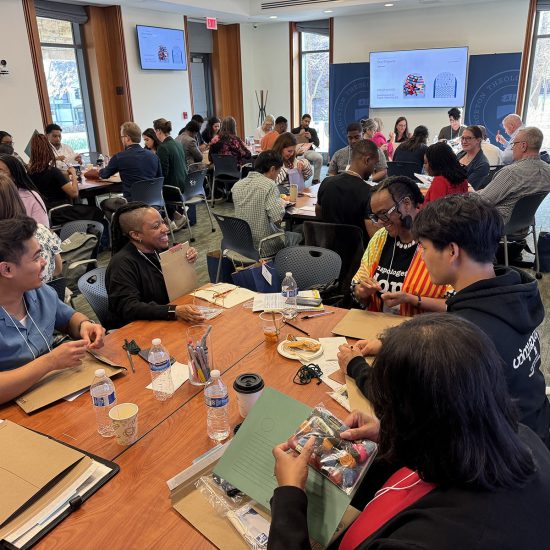BETHESDA, Md. (ABP)—America’s divorce rate is the highest in the world, double that of Canada and triple either England or France, but most divorces don’t need to happen, marriage specialists Mike and Harriet McManus insist.
Married since 1965, the McManuses are co-founders of Marriage Savers, a ministry to help churches and communities make marriages that are “divorce proof.”

|
McManus, a syndicated newspaper columnist who was Time Magazine’s youngest correspondent in 1963, was out of a job in their 10th year of marriage and could find only temporary work in Washington, D.C. They lived in Connecticut, so he became a long-distance commuter, getting on a train at 2 a.m. on Monday, working all week and coming home for dinner at 11 p.m. Friday.
A friend told him about Marriage Encounter, a religious-based weekend program designed to help couples improve their marriage. McManus protested he already had a good marriage, but his friend said the experience would make it better.
After some hesitation, the McManuses went to a retreat where four couples talked about intimate details of struggles within their own marriage. After each talk, the couples were told to write a love letter to their spouse to be exchanged and discussed in private. In response to one question about what the spouse could not or did not share, McManus was shocked to learn his wife felt bruised and deserted by his work in Washington and thought that he loved his job more than her.
It was a turning point for the couple. They began a marriage ministry in their home church, Fourth Presbyterian Church of Bethesda, Md., in 1992. They pioneered the training of couples with healthy marriages to “mentor” younger couples.
In 1986, McManus gave a speech to local pastors in Modesto, Calif., in which he suggested how the city could cut its divorce rate in half. Modesto became the first of more than 200 cities across the United States to adopt a Community Marriage Policy, an agreement across denominational lines to make marriage such a priority in their churches that divorce rates would fall.
Marriage Savers claims divorce rates in those cities have fallen by an average of 17.5 percent and cohabitation by a third.
The ministry also establishes Marriage Savers Congregations, in which mentor couples are trained to help other couples prepare for lifelong marriages, strengthen existing ones and restore troubled marriages.
The strategy can virtually eliminate divorces in the local congregation, the McManuses claim.
The McManuses conduct marriage enrichment weekends at local churches. They also train “back from the brink” couples who once considered divorce to create a “Restoration Marriage Ministry” where they help other couples in crisis restore their relationship.
There has been one divorce for every two marriages since the 1970s, and McManus said churches are part of the problem. About 80 percent of marriages are performed by clergy, but divorce rates in the church are just as high as the rest of society.
The Community Marriage Policy seeks to crack down on “quickie” marriages, requiring any couple getting married to experience a rigorous four months of preparation that includes taking a premarital inventory of strengths and areas where they need to grow. Answers are sent to the mentor couple, which meets with the prospective newlyweds to discuss relationship issues and teach skills of communication and resolving conflict.
In the McManuses’ church, 20 percent of couples decided during the rigorous process not to marry. Of the 230 who did marry, there were 16 divorces in 18 years, a 93 percent success rate that Marriage Savers touts as “virtual marriage insurance.”
Getting clergy to buy in community-wide prevents couples turned away by one minister from shopping around until they find a church that will perform their wedding.
McManus, a conservative columnist who has written “Ethics & Religion” since 1981, recently went after “no-fault” divorce laws that swept the nation starting with the 1970s.
Before no-fault divorce, a married person had to prove grounds for a divorce, such as adultery or physical abuse. If both partners wanted to get out of the marriage, they usually succeeded by claiming “irreconcilable differences.”
Under no-fault divorce, however, a single spouse unilaterally can terminate a marriage entered mutually by both partners, even though divorce is opposed by the other spouse in four out of five marriages. McManus said other state laws also discourage marriage and encourage cohabitation.
In 2005, McManus sparked controversy when USA Today identified him as one of three newspaper columnists to receive funds from the Department of Health and Human Services for work in support of President George W. Bush’s effort to promote marriage.
The newspaper said Marriage Savers received $49,000 from a group that received HHS money to promote marriage to unwed couples who are having children, while McManus boosted the Bush marriage initiative in several columns.
McManus insisted receiving the money did not influence the opinions written in his columns. He later apologized, saying in retrospect he recognized there was a conflict of interest and he should have disclosed that his nonprofit ministry had received a consulting fee from the administration.






